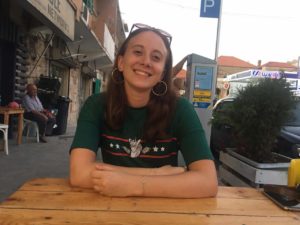Larissa is a first year PhD student from the Department of Politics. She has been awarded the College of Social Sciences and International Studies Global Excellence PhD Studentship. She is studying social movements in ethnically divided societies, with a special focus on Lebanon and Bosnia. Besides from her PhD, Larissa is a political activist, debater, and researcher in Lebanon. She also holds a BA and a diploma in translation and interpretation.
When I started packing on 23 September 2020, preparing for my flight the next day from Lebanon to the UK, I made sure to hide the Lebanese flag between my clothes… As life there became unbearable, I made the difficult decision to leave the country, yet both my heart and mind were still attached to the land I have been fighting for since an early age. And if life has taught me anything since September, it is to never underestimate the impact of the scars you hide underneath your skin on your research and academic productivity.
It is easier said than done to detach oneself from what is happening in the real world, let alone one’s homeland, and solely focus on reading and collecting data related to the research question. That is even harder for students whose research revolves essentially around their own country because they will find themselves, one way or another, watching the news or reading online newspapers. In my case, Lebanon is at the heart of my thesis and keeping track of Lebanese politics is not even an option; instead, it is a pillar upon which my entire research is built. In the following, I will briefly talk about the psychological and emotional impact of watching my country collapse in front of my very eyes on my Ph.D. journey. I will also share a few tips, which can help any PGR student going through the same situation.
Drained is the perfect adjective to describe how I felt every time I watched my people weeping on TV and begging for a piece of bread. Last August, ESCWA confirmed that more than 55% of the country’s population suffers from poverty and the situation has worsened since. In addition to the unprecedented economic, financial, and monetary crises, Beirut was the victim of the third-largest non-nuclear blast in the world last summer, killing around 200 people. Since starting my Ph.D. journey, I have never stopped watching videos, interviews, and news of devasted Lebanese people, the blast’s victims’ parents, and greedy politicians burning my country to the ground. The impact of these tragic developments, coupled with the lockdown and the new Covid19-related shocks, deprived me of sleep, impacted my food diet, and dealt a severe blow to my productivity. I spent weeks unable to finish my readings, to reflect upon my research question, or to feel motivated to accomplish basic tasks (such as recording the minutes of supervisory meetings). Thinking of Lebanon 24/7 and worrying about my parents have become my new daily routine. Thankfully, I was well-aware of the emotional damage the situation has inflicted upon me and was keen on taking action.
First, I decided to seek professional therapy. Mind over matter, remember? PGR students must have a safe space to vent and express their feelings without feeling ashamed. It would also be preferable to choose a therapist from your country. This way, they will be familiar with the situation back home and its impact on you. Second, and maybe that is the most critical part, I started thinking about my thesis’ potential contribution to my country’s recovery. Yes, I still embrace my feelings, but I direct them now towards a new path. I channel those negative feelings into something useful: what is better than being a changemaker in your own country? Think of it this way and believe that you are still serving your country as an activist who has also become a researcher, no matter what topic you are working on. Third, try to take time off during your working hours. Indeed, it is not always possible, but it is crucial to enter your bubble for few hours and solely focus on your Ph.D. Whenever you do that, reward yourself with watching a political talk show in the evening, for example, or choosing an interesting political documentary. Fourth, go out for a walk every day. Connecting with nature revives your soul and assuages your fears. It restores your hope and surrounds you with positive vibes.
Finally, one day before submitting this article, the prominent Lebanese political activist and researcher Luqman Slim was assassinated back home. I spent the entire day watching the news and unable even to speak to anyone. This is to say, never forget that you are a human being, that you have the right to mourn. However, once you wipe off your tears, get back to your desk, take a deep breath, and make a change!
Written by: Larissa Abou Harb


